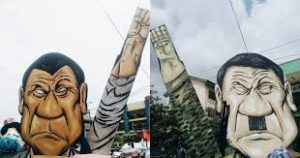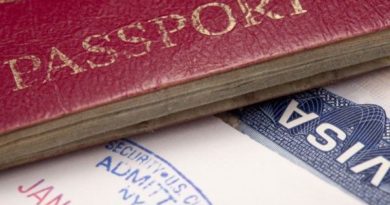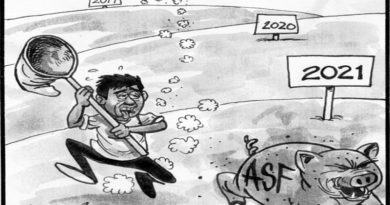POINT OF VIEW – [NEWS] Ping Lacson: Duterte has no power to say who are terrorists -[VIEWS] DU30 Started abusing the Anti-Terrorism Law? So, What Now Ping?
Ping Lacson: Duterte has no power to say who are terrorists
President Rodrigo Duterte does not have the power to proscribe or designate groups as terrorist organizations, the main proponent of the Anti-Terrorism Act said on Thursday.
Under the law, that authority is with the Court of Appeals or the Anti-Terrorism Council (ATC), said Sen. Panfilo Lacson, a former national police chief.
Lacson made the remarks after the President on Wednesday “declared” that communist rebels were terrorists. “The ‘declaration’ is a personal opinion of the President, not official,” he said.
Sen. Ronald dela Rosa, also said that “what the President said are his views.” But he agreed that communist rebels were terrorists as the New People’s Army (NPA) had killed government troops and burned state-owned equipment.
.
“Have you ever seen the NPA do something good? What they do is terrorism,” said Dela Rosa, also a former national police chief.
The legal proscription process in the appeals court entails due notice to the groups and individuals to be proscribed but with the burden of proving that they are terrorists is placed on the Department of Justice (DOJ), Lacson said.
.
Manila RTC case
In 2017, Mr. Duterte issued a proclamation declaring the Communist Party of the Philippines (CPP) and its armed wing, the NPA, as designated or identified terrorist organizations under the Terrorism Financing Prevention and Suppression Act of 2012.In February 2018, the government filed its proscription case against the CPP and NPA, which is now pending in the Manila Regional Trial Court (RTC).
With the new antiterror law in place, the proscription hearings would be transferred to a division of the appeals court authorized by the Supreme Court to handle the case, Lacson said.
The senator said the designation of terrorist groups and individuals followed the guidelines and standards of the United Nations Security Council Resolution 1373, which was passed to counter terrorism across the globe in response to the Sept. 11, 2001, terrorist attacks on the United States.
The ATC, composed of Cabinet members, could also designate individuals or groups as terrorists, but this is only for the purpose of asking the Anti-Money Laundering Council (AMLC) to issue a freeze order on their accounts or assets, which could still be appealed, Lacson said.
For the AMLC, the enactment of antiterrorism law was part of the Philippines’ obligation to deter the transfer of funds for terrorist activities, which must be matched with “the same attention and commitment” to amending the Anti-Money Laundering Act of 2001 so that the local economy could avoid crippling sanctions from international entities.
The country must also “demonstrate effective implementation” of the antiterrorism law before the “observation period” of the Financial Action Task Force (FATF) ends in February 2021, the AMLC said in a statement.
.
Gray list
Failure to do so will result in the country being included on the so-called gray list of the FATF, an international money laundering watchdog, which will then publicly identify the Philippines as a “high-risk jurisdiction with strategic antimoney laundering and counterterrorism financing deficiencies,” it said.
That will put the country on par with other marginally compliant states like the Bahamas, Botswana, Cambodia, Ghana, Iceland, Mongolia, Pakistan, Panama, Syria, Trinidad and Tobago, Yemen and Zimbabwe. Being on the gray list will give a negative reputation to the Philippine economy and the cost of doing business with both its citizens and corporations.
The European Union could then require its members to immediately impose enhanced due diligence on Filipino nationals and businesses, the AMLC said.
.
Closer scrutiny
Subjecting an individual or entity to closer scrutiny would entail additional costs and paperwork or justification for banks and financial institutions, and if those costs outweigh the benefits, they may opt to cease doing business with risky entities or in places that restrict its activities, according to the council.
The additional costs of continuing any relationship under these restrictive rules “will naturally be charged to Filipino nationals and businesses in the form of higher interest rates or higher processing fees,” it added.
.
Vague provisions
The AMLC said those who will be affected by these additional costs included Filipino workers abroad who would have to pay more for remittances, resulting in less money for their families back home.
Critics of the antiterror law continued to pound on what they said were its vague and repressive provisions that could be used by the government to stifle dissent.
One of the most vocal opponents, Albay Rep. Edcel Lagman, who has challenged its constitutionality in the Supreme Court, said that among the measure’s “fearsome tentacles” were prior restraint on the freedom of expression and the right to dissent.
“The principled activists, legitimate political dissenters, and well-meaning citizens are cowed into the silence of the graveyard for fear of reprisal, prosecution, and punishment,” Lagman said.
He also blasted the “errant” statement made by Defense Secretary Delfin Lorenzana who asked Filipinos to “give this law a chance.”
.
Protest in US
“The new antiterrorism law has no saving grace and should not be given any chance to terrorize the people. It must be voided soonest so that the people can enjoy their civil liberties without prior restraint or subsequent punitive action,” he said.Filipino activists and their supporters in the United States called for the repeal of the law which, they said, “mimics the increased state surveillance and state power modeled in the US Patriot Act.”
Members of the International Coalition for Human Rights in the Philippines-US chapter and Malaya: US Movement Against Killings and Dictatorship in the Philippines staged a week long protest ending on Tuesday in at least 10 US cities and in Washington, according to chapter spokesperson Drew Elizarde-Miller.
.
‘Fascism’
“The rise of Duterte’s fascism has not relented, and neither must we relent in our advocacy. The time is ripe to build upon the grassroots movement for the suspension of military aid to the Philippines and make (the US) Congress decisive in introducing a Philippine Human Rights Act that will hold Duterte accountable and withhold US tax dollars from human rights violations in the Philippines,” he said in a statement.
The proposed act is sponsored by several concerned groups, including the Communication Workers of America, United Methodist Church General Board of Church and Society, the United Church of Christ Justice and Peace Ministries, and the Ecumenical Advocacy Network on the Philippines. —WITH REPORTS FROM DAXIM L. LUCAS, MELVIN GASCON AND PATRICIA DENISE M. CHIU
.
<aseanews-op-ed.>
.
[VIEWS] DU30 Started abusing the Anti- Terrorism Law? So, What Now Ping?
.
Balita na-Kuro kuro pa!
.
All photographs, news, editorials, opinions, information, data, others have been taken from the Internet .
.
For comments, Email to :
Jose “Joe” Gibana / [email protected]
7.10.2020












